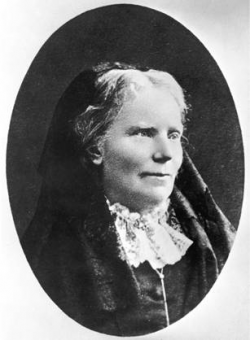Elizabeth Blackwell

- Born
- 3 February 1821
- Died
- 31 May 1910 (age 89)
Blackwell was born in England. Her father was an anti-slavery campaigner and the family moved to America when she was 11. As an adult, Blackwell started off in teaching, which was considered a suitable profession for a woman. Initially, she was repelled at the thought of studhing the body and its illnesses. However she started to consider medicine after a close friend, who was dying, said she would have suffered less if her doctor had been a woman.
Several family friends, who were doctors, told Blackwell that it would be impossible for her to become a physician, but eventually she persuaded two doctors to let her read medicine with them for a year. She applied to more than a dozen schools and was eventually accepted by Geneva Medical College. The faculty asked the male students to vote on her admission. Assuming it would be a joke, they said yes. At first she encountered a lot of hostility and was banned from medical demonstrations, but her ability and persistence eventually won over the other students.
The idea of winning a doctor's degree gradually assumed the aspect of a great moral struggle, and the moral fight possessed immense attraction for me.
Blackwell graduated in 1849. She worked in London and Paris, and studied midwifery. She contracted a serious eye infection from a patient and became blind in one eye as a result, ending her dreams of becoming a surgeon.
She returned to America and set up a private practice in New York. In 1853, she opened a clinic in the slums of New York, that became known as the New York Dispensary for Poor Women and Children. This moved location, expanded, and by 1867 was the New York Infirmary for Poor Women and Children, along with a medical college for women. She worked her with her sister, Dr Emily Blackwell, and Dr Marie Zakrzewska. One of the school’s first students was Sophia Jex Blake.
Blackwell believed that maintaining sanitary conditions was important for good health and she helped to establish the US Sanitary Commission. She and her colleagues gave public lectures on hygiene, set up a health centre, appointed sanitary visitors and campaigned for better preventative medicine.
After establishing her medical college in New York, Blackwell returned to England and set up a private practice in London. She also worked at St Bartholomew’s Hospital (now Barts) and became friends with Elizabeth Garrett Anderson and Florence Nightingale.
In 1875, Garrett Anderson invited Blackwell to become professor of gynaecology at the London School of Medicine for Women, a position she kept until a serious fall forced her to give up the post in 1907.



